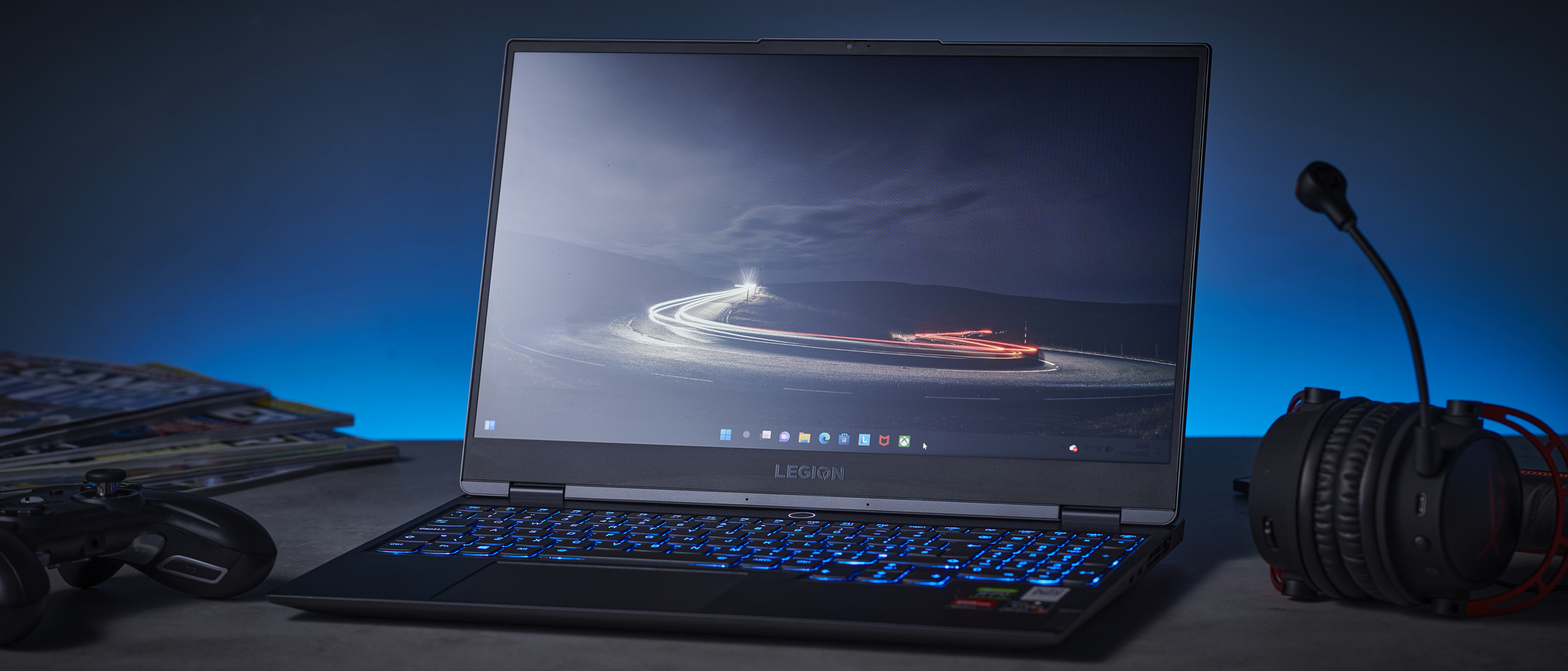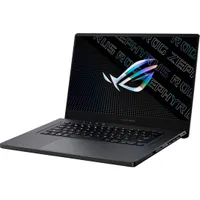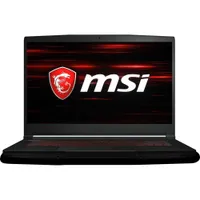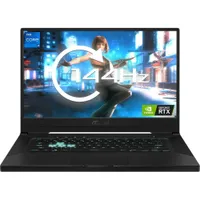TechRadar Verdict
An extremely polished and impressively portable gaming machine that offers very competent performance at 1080p with only a few minor drawbacks. Combined with a sensible price point and surprisingly good speakers, this is a stellar offering from Lenovo.
Pros
- +
Build quality is fantastic
- +
More portable than most gaming laptops
- +
RTX 3060 offers solid FHD performance
- +
Battery life is decent
Cons
- -
Port selection is a tad limited
- -
Runs hot under heavy loads
Why you can trust TechRadar
Two-minute review
Lenovo proclaims the Legion S7 (short for Slim 7) to be ‘the world’s lightest RTX laptop’, which turned out to be an easily disproved statement. The actual lightest RTX laptop is the ROG Flow Z13 from Asus, although that device’s detachable keyboard and dinky 13-inch touchscreen arguably qualify it as more of a hybrid tablet than a true laptop, so we’ll allow Lenovo the loophole.
With a weight of 1.9kg, it’s still hard to deny that the Legion S7 is impressively lightweight given its 15.6-inch display and full-scale keyboard. At less than 20mm thick, it lives up to the ‘slim’ moniker too, but doesn’t appear to remotely compromise itself for that slender form factor. In fact, the Legion S7 sits among the very best gaming laptops in terms of design and build quality, despite the relatively sensible asking price of $1,770 (£1,500, around AU$2,510).
There are a few different models of the Lenovo Legion S7 available right now, and that price gets you the version we’ve been sent for review, which packs an Nvidia GeForce RTX 3060 graphics card and an AMD Ryzen 7 5800H processor, along with 16GB of RAM and 512GB of speedy SSD storage. With these specs, we’d say that the Legion S7 sits roughly in the middle of Lenovo’s gaming laptop range, with the price tag to match.
We’ll get into the specifics of the performance further down, but the RTX 3060 is a pretty dependable GPU for full high-definition gaming; a far better choice for sensibly-priced graphics than the cheaper but somewhat lackluster RTX 3050 and 3050 Ti. We’re expecting solid gaming performance at 1080p without having to drop the graphical settings too much. Similarly, the octa-core 5800H is an excellent choice of laptop processor that should ensure smooth framerates in CPU-bound games and generally stutter-free performance when using the laptop for work or web browsing.
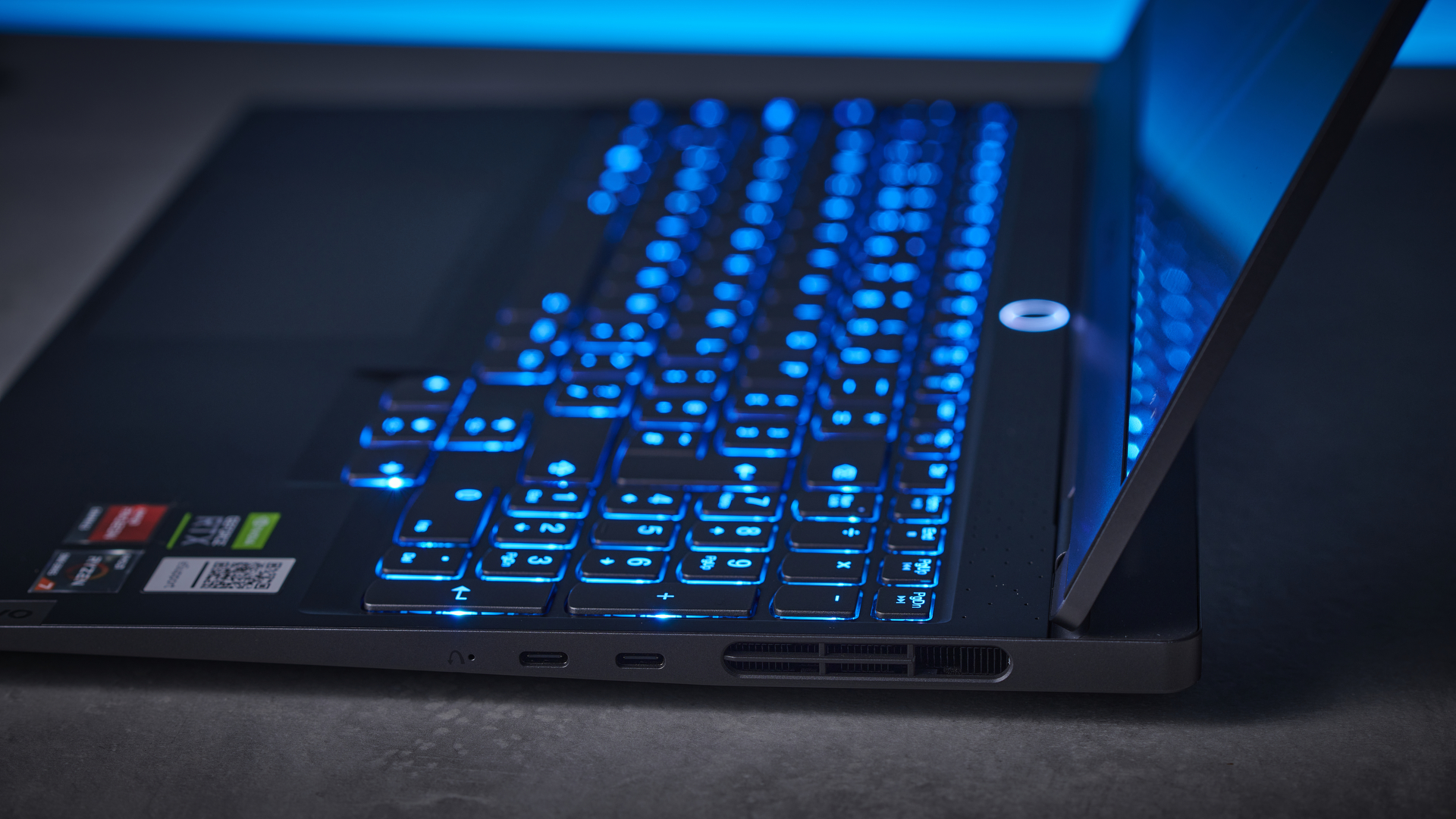
Our review unit also comes with optional RGB backlighting on the keyboard, which can be swapped out for plain white LEDs if you want to save a few bucks. This version of the Legion S7 has a 1080p display, but pricier models packing 1440p and 4K panels are also available. Read on for the nitty-gritty details of our Lenovo Legion S7 review, and find out why we think it’s one of the best gaming laptops we’ve seen in years.
Here is the Lenovo Legion S7 configuration sent to TechRadar for review:
CPU: 3.2GHz AMD Ryzen 7 5800H (octa-core, up to 4.4GHz boost clock)
Graphics: Nvidia GeForce RTX 3060 Max-Q 6GB
RAM: 16GB SODIMM DDR4 (3200MHz)
Screen: 15.6-inch 1440p IPS panel, 165Hz
Storage: 512GB PCIe Gen3 SSD
Optical drive: None
Ports: 2x USB-A 3.2 Gen 2, 2x USB-C 3.2 Gen 2, SD card reader, combi audio jack
Connectivity: Killer Wi-Fi 6 AX1650 11AX (2x2), Bluetooth 5.1
Camera: 720p webcam with privacy shutter
Weight: 1.9 kg
Size: 1.6 x 35.6 x 25.2 cm
Lenovo Legion S7 review: Price and availability
The base price for the Lenovo Legion S7 is $1,200 (£1,400, around AU$1,720), although that only gets you the lowest-spec model of the S7, which uses an RTX 3050 Ti GPU rather than the RTX 3060 we’re testing, which costs $1,770. We’d strongly recommend springing for the RTX 3060, as its greater amount of VRAM and higher clock speed make it a much more reliable choice for stable 1080p gaming.
Paying more enables you to upgrade the CPU, GPU, display, memory (up to 32GB total), storage (up to 2TB), and keyboard backlighting. We’d advise not to bother with the CPU upgrade, which swaps out the Ryzen 7 5800H for a Ryzen 9 5900H; as it’s not a change that’s likely to make a huge difference in most games. Every model comes with Windows 11 as standard, the new normal for gaming laptops.
Sign up for breaking news, reviews, opinion, top tech deals, and more.
It’s worth noting that at the time of writing, all US models of the Legion S7 are discounted by 20% if you buy directly from Lenovo’s website, where you can ‘build’ your ideal model from a selection of parts. Buyers in other territories will have to settle for picking from a small pool of pre-selected models. If you’re shopping from Australia or New Zealand, be aware that import fees may apply.
Price and availability: 4/5
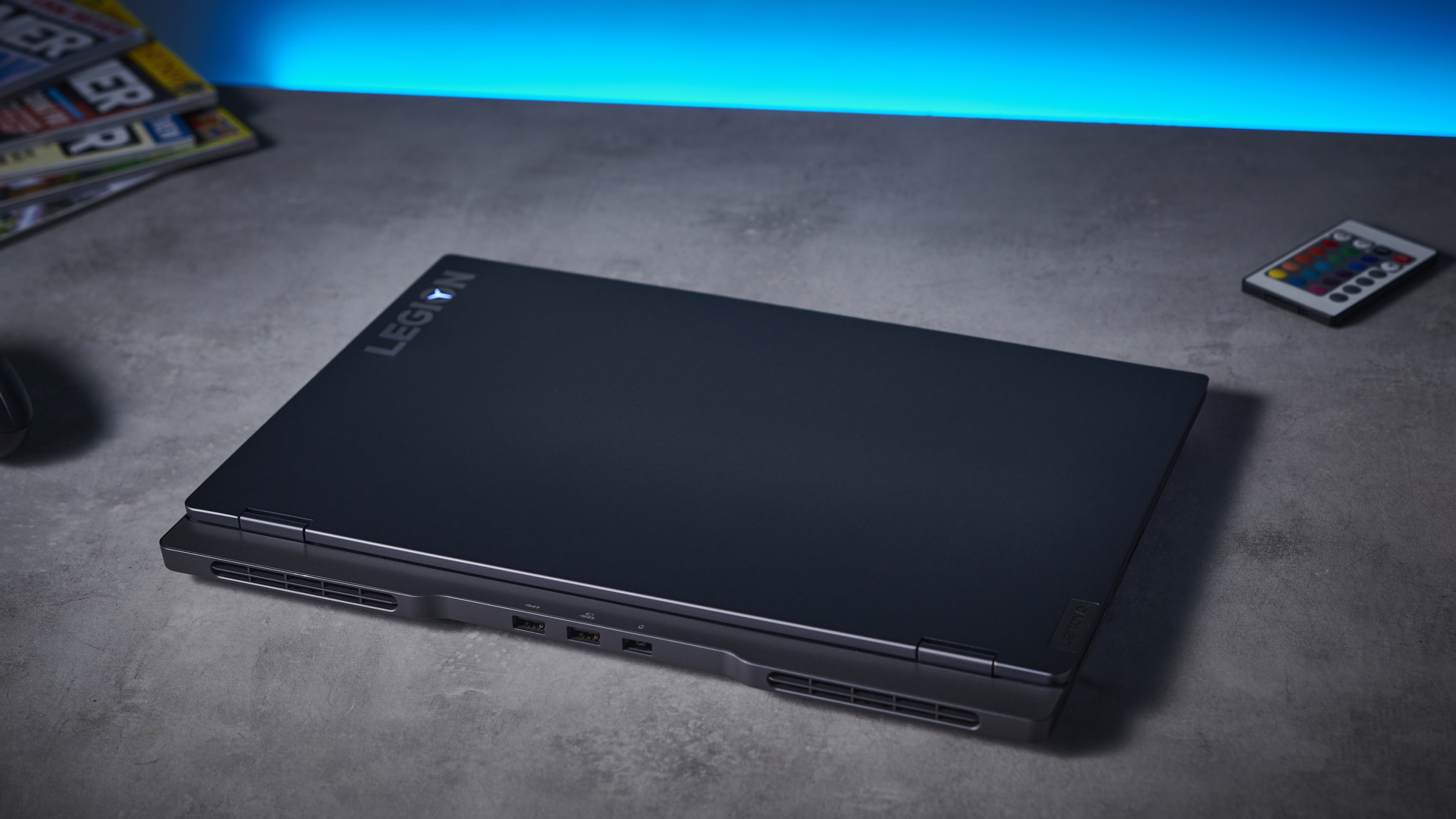
Lenovo Legion S7 review: Design
The Lenovo Legion S7 is an immediate eye-catcher, from its sleek metal chassis to the gently pulsing LED embedded in the Legion logo on the lid. It’s undeniably thin and light for a gaming laptop with a dedicated GPU, possibly one of the most portable 15-inch laptops we’ve seen for a while. The hinge is set forward about 1.5cm from the rear of the laptop, which allowed Lenovo to include small LED indicators for the power port and two USB-A ports situated on the back edge.
Looking around the other edges, we’ve got two USB-C ports on the right-hand side, plus an SD card reader and audio jack on the left. We would’ve liked to see a bigger selection of ports, but it’s enough for everyday use. The front edge of the laptop tapers upwards away from whatever surface you place it on, with the entire assembly sitting on firm rubber feet. The dual speakers are wisely placed on the angled undersides at each front corner, preventing them from being muffled.
Opening it up, we get treated to an incredibly vibrant RGB keyboard and a bright, colorful LCD screen. The 99.3% sRGB color reproduction is excellent, and at maximum brightness this display shows off some fantastic contrast. The 165Hz refresh rate is perfect for esports games, where framerates matter above all else, but bear in mind that the 4K model of the S7 sacrifices this for a fixed 60Hz display. Our model can swap to a locked 60Hz mode to prolong battery life.
That rainbow-backlit keyboard is a pleasure to type and game on, with quiet actuation and a good amount of force required to register input. Overall key travel is perhaps a little less than similar laptops, but that’s unsurprising given the Lenovo Legion S7 ’s slender form factor. The layout is full-scale, with a complete numpad and function keys, and holding down Fn illuminates the keys with a corresponding function for intuitive use.
The trackpad is nice and big, with a firm, responsive click. In our time testing it, palm rejection seemed to work perfectly; despite the trackpad being aligned with the spacebar, we didn’t have any issues with it picking up unwanted input while using a USB mouse.
In terms of other features, there’s not much to write home about; we’ve got a 720p webcam (but no IR camera) for video calls, and a fingerprint scanner built into the power button above the keyboard, should you wish to login using Windows Hello. Both are pretty much mandatory inclusions for a good gaming laptop these days.
Design: 5/5
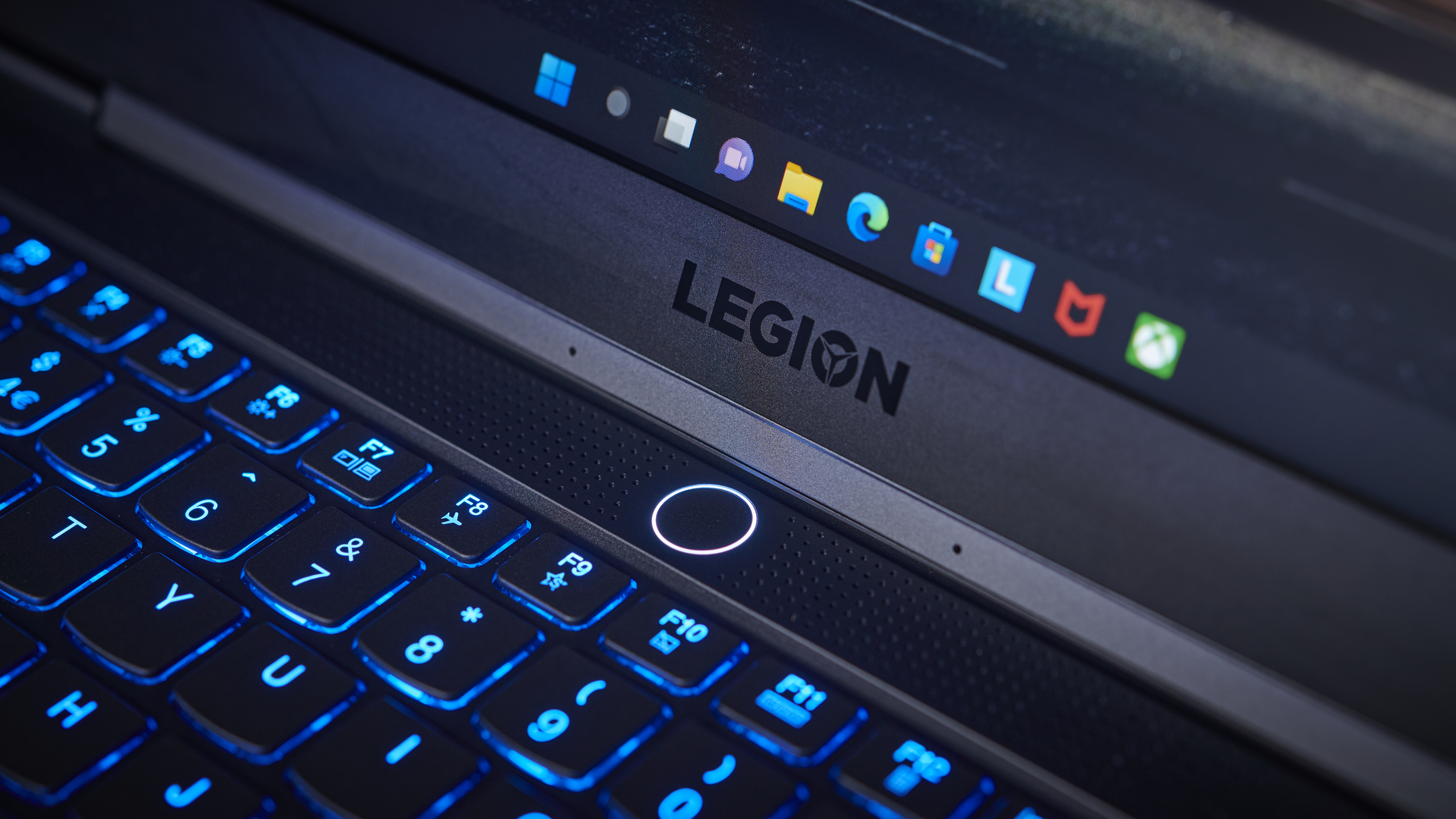
Lenovo Legion S7 review: Performance
The Nvidia RTX 3060 is an excellent graphics card for gaming in HD, even in its shrunken Max-Q variant for slimmer laptops. As demonstrated in our testing, it can’t quite manage a clean 60+ frames per second at ultra settings in the latest games, but it only takes a few minor tweaks (such as lowering texture detail to medium) to clear 60 fps. A bit of extra testing showed that 1440p is doable in some games, but not ideal.
Less GPU-intensive titles should have no trouble running at maximum graphical settings, from older games to esports mainstays like Overwatch and Valorant. Testing Valorant at maximum settings saw stable framerates above 90 fps. The Ryzen 7 processor performs reasonably well in CPU-bound games such as the Total War series, so that won’t prove to be a performance bottleneck for fans of strategy games.
Ray-tracing isn’t really an option here unless you’re willing to compromise significantly in other areas. Attempting to run Cyberpunk 2077 at the Ultra RTX preset (which includes fully ray-traced lighting, shadows, and reflections) brought back unplayable framerates that varied heavily between 10 and 20. Still, ray-tracing is a rather niche feature that isn’t viable in most laptops at this price point, so we won’t hold it against the Legion S7.
General CPU performance is strong, with the eight cores of the 5800H ensuring that the Legion S7 won’t struggle in CPU-intensive tasks. General use, from web browsing to video calls, is nice and smooth with no UI delay. Running multiple Chrome tabs isn’t remotely a problem for the S7.
Although this slimmed-down Legion ran quietly through our testing process, with only a moderate hum from the fans at maximum load that wasn’t audible when wearing headphones, the thinner chassis clearly doesn’t allow for thermal performance on the same level as its chunkier siblings. We’ve definitely seen worse, but the S7 does run rather hot when gaming at higher settings.
Performance: 4/5
Here's how the Lenovo Legion S7 performed in our suite of benchmark tests:
3DMark: Night Raid: 43,271; Fire Strike: 15,849; Time Spy: 6,810
Cinebench R20 Multi-core: 4382
GeekBench 5: 1,453 (single-core); 7144 (multi-core)
PCMark 10 (Home Test): 6,395
PCMark 10 (Battery Life Test): 3 hrs 45 mins
Battery Life (TechRadar movie test): 5 hrs 33 mins
Total War: Warhammer III (1080p, Ultra): 50 fps; (1080p, Low): 148 fps
Cyberpunk 2077 (1080p, Ultra): 51 fps; (1080p, Low): 98 fps
Dirt 5 (1080p, Ultra): 65 fps; (1080p, Low): 139 fps
Lenovo Legion S7 review: Battery life
The Legion S7’s 71Whr battery is solid, if smaller than the ones found in some gaming laptops. Our movie test saw the S7 run for over five and a half hours at 50% brightness, while the PCMark 10 battery life test ran the cells dry in three hours and forty-five minutes. These are undeniably solid figures for a gaming laptop, which tend to be somewhat infamous for their poor battery life.
Using the S7 for extended gaming sessions without plugging in isn’t going to be an option, but it can comfortably handle a commute provided you’re willing to turn off the RGB keyboard and drop the brightness a bit. Switching the display from 165Hz to the aforementioned 60Hz mode saves you some power, too.
Packaged with our Legion S7 was a 230W power supply, with smaller 170W and 180W models available depending on territory. The battery charges to full in under two hours (while not using the laptop), which is pretty impressive.
Battery life: 5/5
Buy it if...
You want premium quality
The chassis and keyboard of the Legion S7 are among the best we’ve seen in a gaming laptop, and it doesn’t break the bank to achieve this either. There aren’t any significant features that we’re disappointed weren’t included here.
You want to game at 1080p
Although 1440p and 4K screen variants are available, the S7’s RTX 3060 GPU is best suited for gaming at 1080p. It’s a dependable graphics card, though, and should enable you to get good framerates in all the latest games at FHD resolution.
You need portable power
It’s not the smallest thanks to that 15.6” screen, but the S7 lives up to the ‘slim’ part of its name. It’s not especially heavy either, which makes it ideal to pop in a rucksack or laptop bag for a spot of gaming on the morning commute.
Don't buy it if...
You need lots of ports
The Lenovo Legion S7 has enough ports for the average user, but it’s hardly a broad selection. Situating the USB ports on the rear edge is a somewhat curious choice from Lenovo too, since it makes plugging in a flash drive much less convenient.
You need it cool
If you want a laptop you can actually put atop your lap, avoid the S7. The metal casing gets pretty damn warm during extended gaming sessions, so it’s better off placed atop a desk than used in bed.
You’re on a tight budget
Considering the build quality and general performance, the Legion S7 is actually very reasonably priced. Still, there are definitely cheaper gaming laptops on the market right now (including some from Lenovo itself), so if your wallet is even slimmer than the S7, it might be worth looking elsewhere.
Also consider...
Asus ROG Zephyrus G15
Simply the best gaming laptop money can buy right now. Offers amazing performance in a stylish package for incredible value given the specs. It also packs top-notch battery life that outstrips its peers, although the tenkeyless keyboard will be a turn-off for some.
Check out our Asus ROG Zephyrus G15 review
MSI GF63
Our current favorite budget gaming laptop, the MSI GF63 isn't particularly flashy, but its value for money is unquestionably one of the best around right now. Despite its low price, the GF63 doesn't look nor feel cheap, with a sturdy design and vibrant display.
Check out our MSI GF63 review
Asus TUF Dash F15
It's a little more expensive than the MSI GF63, but the TUF Dash F15 is still a great-value gaming laptop with a lovely new thinner and lighter form factor that makes it even more attractive than the original TUF F15.
Check out our Asus TUF Dash F15 review
First reviewed June 2022
How We Test
We pride ourselves on our independence and our rigorous review-testing process, offering up long-term attention to the products we review and making sure our reviews are updated and maintained - regardless of when a device was released, if you can still buy it, it's on our radar.

Christian is TechRadar’s UK-based Computing Editor. He came to us from Maximum PC magazine, where he fell in love with computer hardware and building PCs. He was a regular fixture amongst our freelance review team before making the jump to TechRadar, and can usually be found drooling over the latest high-end graphics card or gaming laptop before looking at his bank account balance and crying.
Christian is a keen campaigner for LGBTQ+ rights and the owner of a charming rescue dog named Lucy, having adopted her after he beat cancer in 2021. She keeps him fit and healthy through a combination of face-licking and long walks, and only occasionally barks at him to demand treats when he’s trying to work from home.
